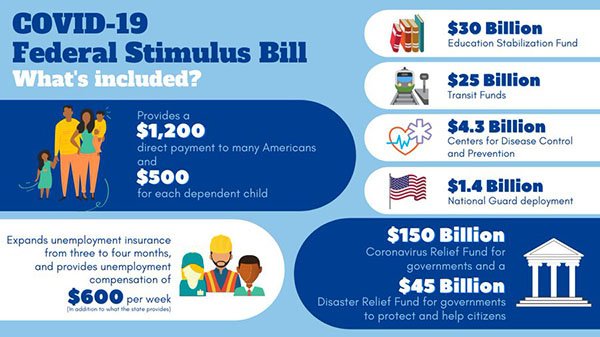Federal Stimulus Bill and Oregon
 Congress passed a record $2.2 trillion economic stimulus bill to help our nation recover from the coronavirus crisis that was signed into law on March 27, 2020. We want to provide SEIU members with an overview of how it could impact us in Oregon and Washington.
Congress passed a record $2.2 trillion economic stimulus bill to help our nation recover from the coronavirus crisis that was signed into law on March 27, 2020. We want to provide SEIU members with an overview of how it could impact us in Oregon and Washington.
- One-time payments of $1,200 per adult and $500 per child for individuals earning less than $75,000 and couples earning up to $150,00 annually. Individuals who earn $99,000 and couples earning $198,000 wouldn’t receive payments. You can calculate what you could expect here.
- Unemployment benefits would increase up to $600 per week and expand to include part-time and self-employed workers for a total of 39 weeks.
- State social services will receive $150 billion.
- Small businesses would receive up to $350 billion in loans which could turn into grants.
- Large industries would receive up to $425 billion in loans.
The bill still has some weak spots: for example, it requires airlines receiving assistance to maintain employment levels as of March 24 “to the extent practicable,” rather than making that a firm commitment. However, it does strengthen corporate accountability. One of our biggest concerns with earlier versions of the bill was that there was little accountability to corporations who would receive federal funding during this crisis. The final version strengthens guardrails on lending and adds transparency requirements. You can see a more complete breakdown here. Anxious to receive your check? Government will start making stimulus payments in mid-April via direct deposit payments (if you gave the IRS such information 2018 or 2019, this is how your check will come). Paper checks will begin to be issued in early May with lowest income people receiving their checks first. You can calculate what you could expect here. Also note that we have learned immigrant Oregonians cannot access any of the benefits in the federal stimulus package. This is why we have worked with our community partners to develop the Oregon Worker Relief Fund (OWRF). The Oregon Worker Relief Fund would provide temporary financial support for Oregonians that are falling through the cracks during our current global pandemic. Immigrant Oregonians are the backbone of many of our communities and economies. Take action TODAY to ensure that ALL of Oregon's workers can take care of themselves and their families.
SEIU Efforts
The coronavirus pandemic has changed life for us all. On March 23rd, Governor Kate Brown ordered everyone in Oregon to only leave home for necessities, including only essential personnel allowed to go to work. There’s a great deal of uncertainty; we don’t know how long this will last or how much damage will be done to our collective health and economy. We do know that we need immediate relief for workers and businesses, and a long-term recovery plan to get our state back on track. That’s why it’s so important to make sure that Oregon’s recovery plan protects all workers. Our Union has worked with other labor leaders and advocates to develop a policy that prioritizes Oregon’s taxpayer dollars to go towards helping working families. It’s essential that our state’s plan includes no rollbacks on worker protections and no business relief without centering workers. Recovery will cost more resources than Oregon has. That’s why we must first use federal resources, and use state resources cautiously in a way that reflects our values. Oregon must center our coronavirus relief on workers. Here’s how you can help today:
- Continue to practice social distancing/shelter-in-place, and follow guidance from public health professionals as well as new laws and rules in Oregon.
- Join the push to demand more personal protective equipment for workers by signing our petition.
FAQ Pages by Industry
Kaiser Permanente MembersHealthcare Members - Non-KaiserProperty Services Members
Immigrant communities hard hit by COVID-19, but can seek care without fear of public charge The U.S. Citizen and Immigration Services (USCIS) released guidance on March 13 that it will not consider testing, treatment, or preventative care (including vaccines, if a vaccine becomes available) related to COVID-19 as part of a public charge determination. This includes if care is paid for by the Oregon Health Plan. The term “public charge” or "public charge analysis" is used by immigration officials to decide whether a person can qualify for a visa, enter the United States or get lawful permanent resident status (i.e. a green card), extend their stay, or change their status. More information is available from the Oregon Health Authority. Even with treatment options available, COVID-19 has ravaged the lives of many low-wage employees, including many immigrant Oregonians. This is of utmost importance now that we have learned that immigrant Oregonians cannot access any of the benefits in the federal stimulus package. That is why we have worked with our community partners to develop the Oregon Worker Relief Fund (OWRF). Let your legislator know that #ALLWorkers need to be protected! The Oregon Worker Relief Fund would provide temporary financial support for Oregonians that are falling through the cracks during our current global pandemic. Immigrant Oregonians are the backbone of many of our communities and economies. Take action TODAY to ensure that ALL of Oregon's workers can take care of themselves and their families.
